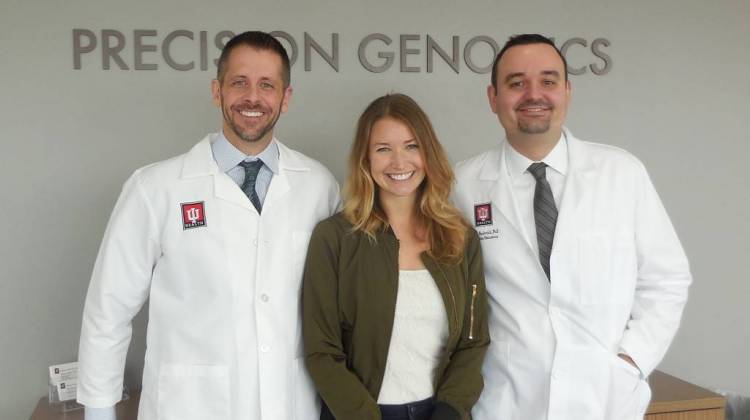
From left to right, Dr. Brian Schneider, patient Gwen Brack and Dr. Milan Radovich.
Jill Sheridan/IPB NewsGenomic sequencing maps your DNA and doctors and scientists can use this information to find the best treatment for a specific person. Some potential treatments are not as invasive as traditional chemotherapy – in fact, one may already be in your medicine cabinet.
Indiana scientists are reporting encouraging success with this precision medicine. Dr. Milan Radovich is genomics scientist and co-director of the Indiana University Precision Genomics Group in Indianapolis.
“Cancer is in its essence a disease of the DNA,” says Radovich. “Cancer is caused when there are certain typos in the blueprint.”
Radovich says those typos are mutations that can transform a single normal cell that becomes cancerous and a tumor starts to grow.
The Precision Genomics Group recently opened a new clinic in Indianapolis where they can sequence a person’s entire genome in a few days, it used to take a lot longer.
“We had hundreds of machines sequencing a single genome and that took 11 years – so now it takes one box that you can fit on top of a table, and it takes a couple days,” Radovich says.
Unlocking the genomic map allows scientists to advance treatments in many conditions, but much of the work has been done in cancer treatment. Dr. Bryan Schneider, is the other co-director of the IU Health Precision Genomics group.
“If you take mechanic analogy, it’s like popping up the hood of a car, by understanding the genomics you can really start to see, on intricate, levels what makes it different,” Schneider says.
What makes each cancer so different? Schneider says a look at the genetic level reveals surprises.
“There are some forms of breast cancer that looks like ovarian cancer, more than breast cancer,” says Schneider.
And this is redefining some approaches to cancer treatment.
“As we begin to think about the cancer more in terms of what drives it as opposed to what body part did it start in,” he says.
That’s where personalized medicine comes in, each person’s therapy tailored to their specific genetic mutation. But one cancer genome could have more than 100,000 mutation and finding matches can be tricky.
“It’s like playing the adult version of ‘Go Fish’ – you’re trying to find what typographical errors activate what pathways that might match best with a drug developed to inhibit it,” says Schneider.
And sometimes you get lucky.
Gwen Brack was a 21 year-old, junior in college when she diagnosed with stage IV rectal cancer. That’s when she had her first chemotherapy treatment.
“I proceeded to have proton radiation therapy and then my first major surgery the following fall,” says Brack.
She had numerous rounds of chemotherapy, some of them extremely toxic.
The cancer had spread and she had numerous rounds of chemotherapy drugs and nine abdominal surgeries – over nine years.
“Then a year ago, we found a tumor on my bladder,” says Brack.
That was when she was referred to the precision genomics program in Indianapolis. When they sequenced her genome they found a particular mutation – a mutation that was the focus of some recent research.
“I remember when Dr. Schneider emailed me the NY Journal of Medicine article and was like nerd out on this because we’ve got good news coming for you,” says Brack.
Turns out, aspirin can block some cancer causing genes.
“That aspirin could be the miracle drug in my case,” says Track. “You can imagine my relief.”
Today Brack is celebrating one year of being cancer free.
In total, Indiana University health operates five clinics across the state that provide access to precision medicine.
 DONATE
DONATE









 Support WFYI. We can't do it without you.
Support WFYI. We can't do it without you.